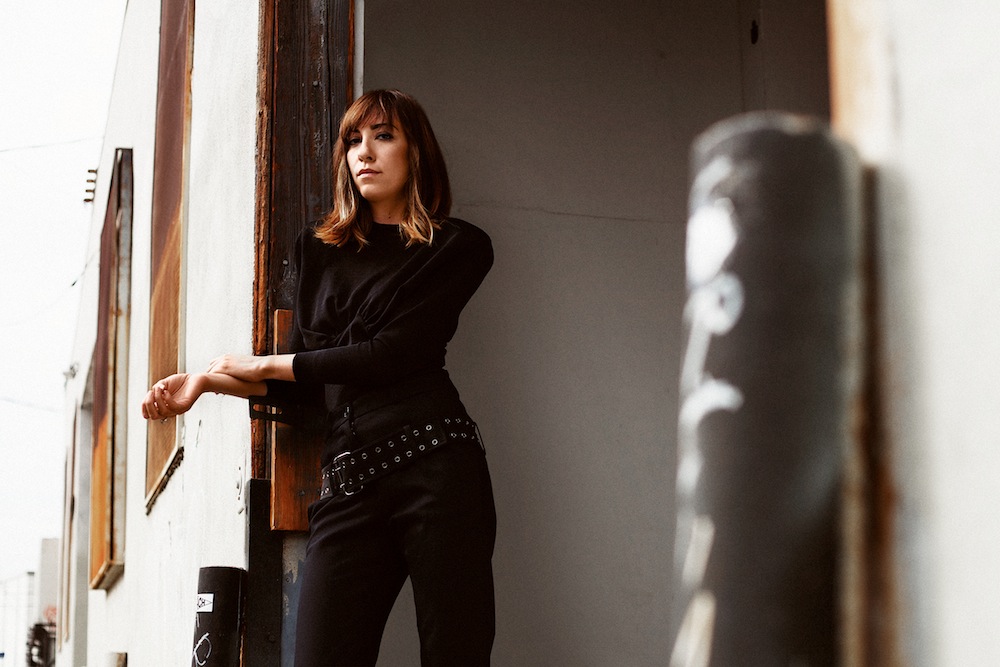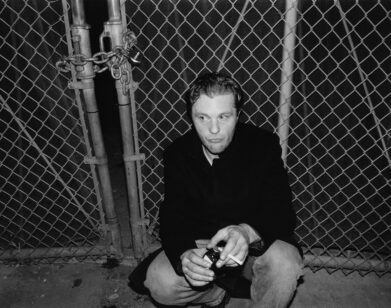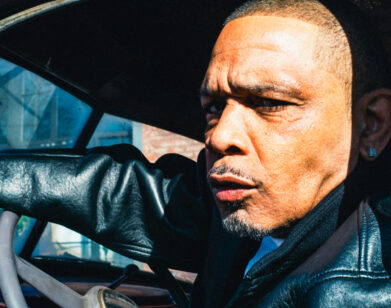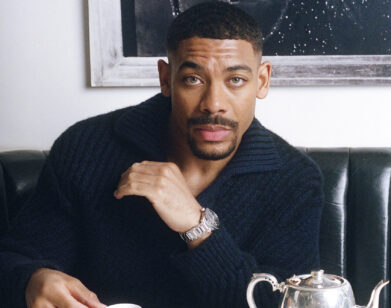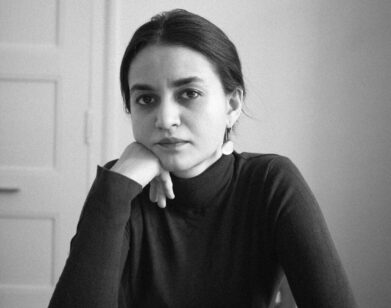The Third Generation Filmmaker
ABOVE: GIA COPPOLA AT WILD HONEY STUDIOS IN L.A., NOVEMBER 2013. PHOTOS: BRIAN HIGBEE. STYLING: MADISON GUEST. STYLING ASSISTANT: MAISIE COCHRAN. HAIR AND MAKEUP: JACQUELINE KNOWLTON.
“I never particularly liked it in New York City,” says recent L.A. transplant Gia Coppola from her new apartment. “But I just felt like if I didn’t move now, I’d never do it. I just needed to try and have a change.”
Things are certainly changing for the aspiring filmmaker. After studying photography at Bard College and making a few fashion shorts for the likes of DVF and Opening Cermony, earlier this year Gia showed her feature-length debut, Palo Alto, at the Venice and Toronto film festivals. Not only did Gia direct the film, she also adapted the script from James Franco’s 2010 book of short stories. A tale of disaffected teenagers in the well-to-do suburb of San Francisco, Gia melds Franco’s disparate characters into four protagonists: good girl-gone-jaded April (Emma Roberts), class clown Fred (Nat Wolff), impressionable innocent Teddy (Jack Kilmer), and smarter-than-you-think school slut Emily (Zoe Levin). The adults in the cast are familiar faces: Val Kilmer (Jack’s dad), James Franco, and Chris Messina all make appearances, as does Gia’s mother, Jacqueline Getty.
To the outside world, it comes as no surprise that Gia should enter the world of filmmaking. The only child of Gian-Carlo Coppola, who died before Gia was born, the 26-year-old is the granddaughter of Francis Ford Coppola and the niece of Sofia and Roman. For Gia, however, her career path was never so straightforward.
EMMA BROWN: When did you decide to become a director?
GIA COPPOLA: I was always doing these smaller things with fashion companies, and those were fun. I was doing them with my friends, and they’re like an extension of photography, but with more challenges that made it exciting. But I never thought about doing a feature film until I met James [Franco]. He was the one that felt I could do it and pushed for it. It wasn’t ever in my mindset until he thought I was capable of doing it. I used those fashion films as practice.
BROWN: How did you meet James?
COPPOLA: We met really randomly. I had seen him at a deli and my friends and I were giggling: “Oh, there’s James Franco!” Then, later that night, someone introduced us at a party—my mom introduced us at a party—and we had a mutual friend in common. I was like, “I saw you earlier today at a deli.” And he was like, “Yeah, I remember.” He thought my friends and I were all just a bunch of rowdy teenagers, or young adults. We just hit it off. He was very nice and always interested in what younger people are up to and doing and creating. He likes to be a teacher. We just shared my photos and he shared his book.
BROWN: I would be too embarrassed to admit that I’d seen him earlier.
COPPOLA: [laughs] Yeah, he’s a very easy-going guy. He sets the tone to be comfortable around him.
BROWN: Had his book already come out?
COPPOLA: No, he sent an advanced copy of Palo Alto to me. He had written a book and he didn’t want to direct it himself because it would feel like redoing something he’s already done. He felt it was more interesting to have someone else do it. When we were showing him my stuff, I think he thought it fit right.
When he gave me the book, I loved it. I connected with it because it resembled a lot of my teenage experiences and I thought some of the dialogue was really funny. He writes women really well. I thought he depicted the young teenage girl experience really well. I hadn’t seen anything that I connected with in a long time that portrayed teenagers.
BROWN: Were you nervous at all about accepting the job?
COPPOLA: When he first approached me, I was super excited, and I had just finished college. It was like a dream come true to have a job that felt creative and that I was excited about. I don’t think I realized what I was getting myself into until the first day of shooting when I was like, “Oh, my God. This is really happening.” I got freaked out for a second. Then it just started becoming really fun. There were, like, 30 of us and it was a young crew and the teenagers were really fun.
BROWN: Was it hard at all to establish your authority as a director?
COPPOLA: No, we were like a family. Movies are a collaboration, I feel, so I didn’t think of myself as an authoritative figure as much. I thought I was a teenager hanging out with all of them, but they viewed me as, “Oh, you’re closer to 30…you’re old.”
BROWN: Did you ever have anxiety dreams while you were filming?
COPPOLA: Yeah, I started talking in my sleep, saying weird things. I had dreams of Avid editing bars moving around. It was really weird.
BROWN: Jack Kilmer and Nat Wolff are both great in the film. How did you discover them?
COPPOLA: I’ve known Jack since he was little. Then, when I was working on my grandpa’s movie Twixt (2011), I met Val [Kilmer] and Jack would come visit. So I remember him as he was getting older and I became really close with Val. It was really refreshing meeting a bunch of kids. He seemed like someone who was really real and he does a lot of things: he paints and he makes music; he surfs and he skateboards. He has a realness that adds to his character. Nat and I just hit it off. We met in a meeting through CAA and he really understood the script and referenced a lot of the things that I had referenced for that character. It just seemed that he really understood it. I had seen his movie, I guess it’s called Stuck in Love (2012) now, and he was really charming in it. I got really lucky that him and Jack had a great, real friendship.
BROWN: What were the references for his character?
COPPOLA: For his character, it was Mean Streets (1973)—Robert De Niro and his friendship with Harvey Keitel. The friend that always gets you into trouble—he’s still so loveable, but he’s not really a good influence.
BROWN: James’ character is wonderfully creepy. Did he ask to play that part or did it happen organically?
COPPOLA: No, he never mentioned it. I was nervous to ask him because I thought he didn’t want to do it. It was probably weird for him to be in his own book and play a character—to know these characters that were based off of his own life experience. But I didn’t think of it that way. Then, when I asked him he was very nice about it and said of course he would. It was really nice for me to have him on set because he also does directing, so he helped me block some scenes and I got to know more about the characters. Working with a great actor is really educational.
BROWN: What was the first movie set that you were on?
COPPOLA: When I was a baby, my mom was always bringing me onto set. Maybe New York Stories (1989) or Godfather III (1990)? I remember more my aunt and uncle making their movies and, as I got older, my grandpa started making movies again.
BROWN: Your mother plays a small role in Palo Alto. Did you know as soon as you read the script that you wanted her to be in it?
COPPOLA: [laughs] Yeah, I always wanted her to do it, but she didn’t really want to do it. She’s a great actress. My uncle had put her in a play that he did one summer, so we always knew that she was great. Now that she’s done it she loves it and wants to do it all the time.
BROWN: What did you want to be as a child if not a director?
COPPOLA: I wanted to be a ballet dancer. I was bad—I’m not very coordinated. But I always wished I could have been a dancer.
BROWN: Did directing a film make you watch films differently?
COPPOLA: Yeah. While I was editing, it was really hard to watch movies. It really bummed me out. I was sad and scared that I ruined something that I enjoyed so much, but now that I’m out of that process and time has gone by it’s been fine and it’s easy to watch movies again. It’s more exciting because I can kind of see how certain things are done. It’s amazing how everyone has their different ways of working. I like hearing about that process, reading about it. I have so much appreciation for movies because I understand how hard it is to make one. There is always something I gain from watching a movie, whether it’s a silly romantic comedy or an art film.
BROWN: Was your mother strict about what movies you could watch as a child?
COPPOLA: There were always interesting movies at my family’s house, but I didn’t really understand what they were until I got older and I was like, “Oh, I’ve actually seen this before.” The rule was that we weren’t allowed to watch movies in the daytime. We had to enjoy the day and at night we could watch a movie. The only thing was violence, when I was younger, was not really allowed.
BROWN: Were you allowed to watch any of your grandfather’s movies then?
COPPOLA: No one wanted to watch those movies because they had all seen them a million times and none of my friends wanted to take on the responsibility of watching them with me. One day, as I started getting interested in film, I just watched them by myself. It’s so amazing to have someone who is so talented and so wise to talk to and hear about that time. I have a lot of appreciation for my family.
PALO ALTO COMES OUT THIS SPRING.
For more of our 14 Faces of 2014, click here.

